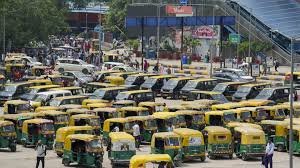
Transportation services across parts of Delhi and the National Capital Region (NCR) were disrupted on Thursday as auto and taxi drivers embarked on a two-day strike. The strike, organized by various unions, is aimed at addressing grievances regarding the impact of app-based cab services on their livelihoods.
Kishan Verma, president of the Delhi Auto Taxi Transport Congress Union, spearheaded the strike, citing concerns over the competition posed by companies like Ola, Uber, and Rapido. According to Verma, these cab aggregators are significantly affecting the income of traditional auto and taxi drivers. “The strike is to save jobs and provide for the families of auto and taxi drivers,” Verma stated.
The protesting drivers are demanding a complete ban on these app-based services, alleging that these companies are operating illegally by using private vehicles—such as cars with white number plates, motorcycles, and scooters—to transport passengers. “We urge the central and state governments, including Delhi, to impose a complete ban on these mobile app-based companies,” Verma added.
The dissatisfaction among drivers is evident from their claims about unfair competition. “Passengers pay Ola and Uber Rs.20/km, but we only receive Rs.8-9/km. This is very low, and CNG prices are also high. We demand that our rates be increased to at least Rs.15-20/km,” a taxi driver told news agency IANS.
Despite the strike, some unions, including the Delhi Auto Rickshaw Sangh, chose not to participate. Rajendra Soni, general secretary of the Delhi Auto Rickshaw Sangh, criticized the strike’s effectiveness, noting that autos and kali-pili taxis continued to operate in the city. “The strike is ineffective because autos and taxis are still plying on the streets. We are not on strike,” Soni said.
Residents noticed the impact of the strike, with fewer autos available and longer waiting times. Vishal Thakur, a resident of Dwarka, mentioned that he had to wait longer than usual to get an auto to Dwarka More metro station.
Delhi’s transport department reports that there are around 1,50,000 motor cabs registered in the city, including 95,000 autos and 10,000 kali-pili taxis.
Sources By Agencies

